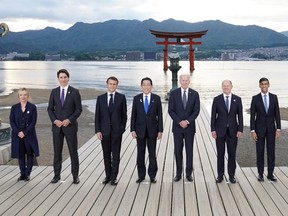加拿大目前的發展似乎差強人意,連美國主流媒體都不怎看好。華爾街日報:加拿大正遊離七國集團外
最近,美國著名報刊《華爾街日報》在一篇社論中表示,加拿大在領導能力、經濟、國防占比等方麵的表現,讓人懷疑其已經遊離在七國集團之外。
philiph Cross: the wall street journal asks a good question - does Canada belong in the G7
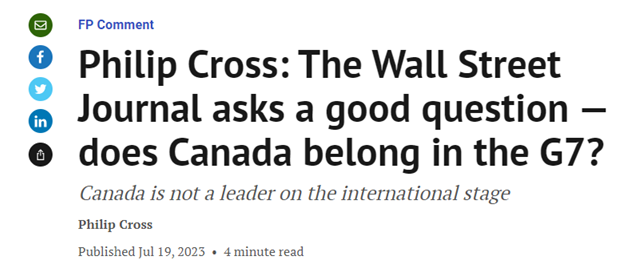
社論認為,加拿大在國際舞台上不是一個領導者。正如全球事務專家伊恩•布雷默在其著作《Every Nation for Itself》中所言,領導者擁有協調跨國問題的杠杆,擁有財富和權力,可以說服其他國家采取他們本不會追求的行動。它支付其他國家負擔不起的賬單,並提供其他人不願支付的服務。在一個又一個問題上,它製定國際議程。然而,加拿大做出這些事情似乎遙不可及。
缺乏領導力的部分原因在於,這十年多來加拿大經濟增長疲軟,讓其逐步遠離世界經濟重要參與者的角色。隻有當經濟複蘇為重建我們的軍事實力和經濟實力提供所需的資金,並且擁有經濟重量使其他國家渴望進入我們的市場時,加拿大才能在世界舞台上恢複其地位。
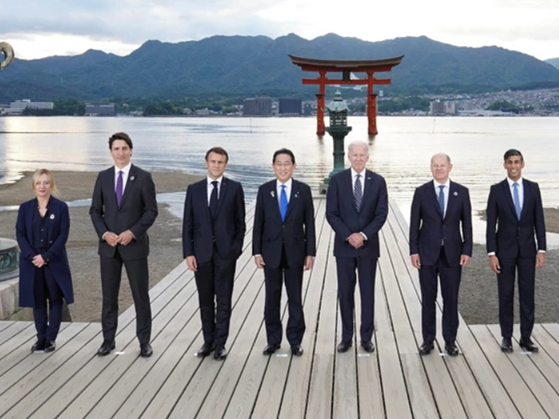
社論還提到,在七國集團中,加拿大的國防支出墊底。這讓人質疑加拿大是否仍願意承擔七國集團成員的責任。
然而,加拿大受到的限製不僅僅是由於其相對較小的人口和經濟,還受到一種“加拿大人不思大事”的心態所束縛,正如藝術曆史學家芭芭拉•道奇所說。如今,加拿大追求的是友善和進步,而不是偉大或強大。
社論引用了加拿大總理特魯多在2021年向國防部長發出的任務書,其中將“建立一個包容和多元的國防團隊,努力打造一個健康的工作環境,擺脫騷擾、歧視、性行為不端和暴力”確定為首要任務。

社論暗示,不解決上述問題,加拿大應該坐在“小孩子”那一桌,而不是“成年人”那一桌。
《華爾街日報》得出結論,如果加拿大不想扮演那個角色,那麽七國集團應該考慮尋找替代者。
TD Economics:加拿大生活水平下滑 人均GDP增長滯後
拋開領導力、國防等方麵不說,上述社論所提及的加拿大經濟現狀,不無道理。
道明經濟研究公司(TD Economics)的一份新報告稱,加拿大看似經濟從疫情中強勁複蘇的事實,實際上掩蓋了發達經濟體生活水平表現不佳的情況。
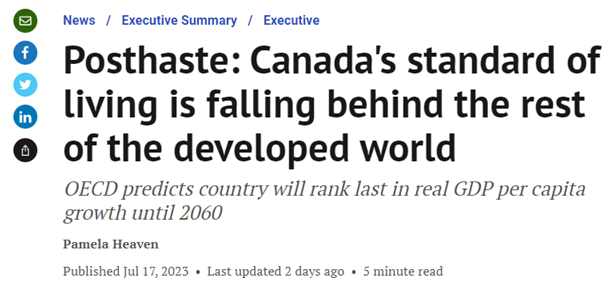
道明銀行經濟學家 Marc Ercolao 表示,“經濟增長並不一定等於經濟繁榮。”
從表麵上看,加拿大的經濟增長看起來很健康。“強勁”的移民和人口增長幫助推動了疫情後經濟活動的快速複蘇,特別是消費和房地產市場。
根據加拿大統計局的數據,2022年加拿大增加了105萬人,其中約96%的增長是由於國際移民。這是加拿大曆史上首次單年人口增長超過 100 萬人。
這一增長使得加拿大保持了G7國家中人口增長最快國家的地位,目前加拿大的人口增長率為2.7%,這樣的速度將使加拿大人口在大約26年內翻一番。
到2023年6月16日,加拿大總人口已突破4000萬人。
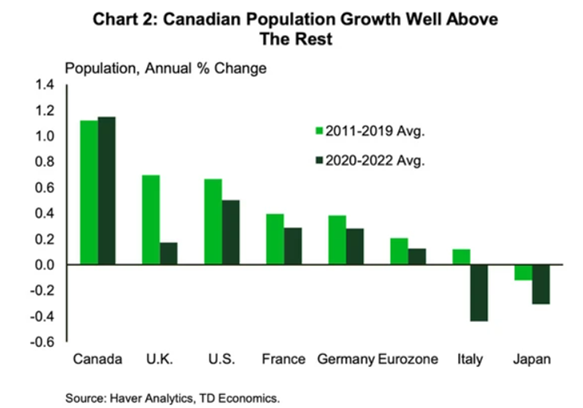
然而,Ercolao 說,“雖然 GDP 總量是一回事,但生活水平是另一回事,當加拿大的經濟表現根據不斷增長的人口數量進行調整時,它所揭示的情況還有很多不足之處。”
在世界舞台上,以實際人均國內生產總值衡量,加拿大是少數幾個尚未恢複疫情前生活水平的發達經濟體之一。
實際人均國內生產總值這一指標在過去三個季度出現萎縮,道明銀行預測,該指標將持續萎縮,直至 2024 年底。
更令人擔憂的是,經濟合作與發展組織(OECD)預測,在 2060 年之前,加拿大的實際人均國內生產總值增長將在經合組織成員國中墊底。
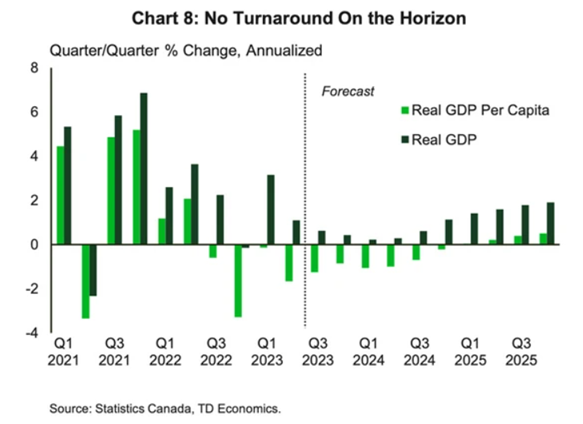
Ercolao 表示,20 世紀 80 年代初,加拿大的人均 GDP 比發達經濟體的平均水平高出近 4,000 美元,但到 2000 年,這一優勢幾乎消失。那一年美國的人均GDP超過加拿大 8,000 美元以上。
自 2014-2015 年石油危機以來,“加拿大的表現每況愈下”,每年僅上漲0.4%,而發達經濟體的平均增長率為 1.4%。
Ercolao 表示,問題的核心是生產率下降,這是加拿大多年來一直在努力解決的問題,他指出了造成這一問題的幾個因素。
其中包括過去八年對建築、機械和知識產權的商業投資“乏善可陳”,以及研發支出的長期下降導致了“創新差距”。

Ercolao 說,“過去20年來,加拿大的研發投資一直在下降,而其他七國集團國家的研發投資卻有不同程度的增長。”
2021 年,加拿大的研發支出約占 GDP 的 1.7%,是美國份額的一半,並且低於大多數其他國家。
加拿大經濟還包含相對較多的小公司,這些公司的出口和投資往往少於大公司。他說,低效的監管和稅收政策是阻礙生產力和創新的其他因素。
有些省份的情況會好一些。由於能源部門的支出,石油資源豐富的阿爾伯塔省、薩斯喀徹溫省和紐芬蘭及拉布拉多省的人均 GDP 水平最高。

但自上個十年的石油危機以及該行業從大型項目和投資轉向以來,它們的地位也一直在下滑。
Ercolao 說,“不幸的是,對於加拿大人來說,加拿大人的生活水平幾乎沒有好轉的跡象。”
這個問題之所以沒有引起注意,是因為生產力問題被新工人湧入帶來的增長所掩蓋,但 Ercolao 表示, “越來越難以忽視加拿大與其它主要經濟體之間不斷擴大的實際人均 GDP 差距。”
不過,從2022年的統計數據來看,在世界主要經濟體係的人均GDP中,除了美國、澳洲和部分北歐發達國家所占據的第一檔(高於6萬美元)之外,加拿大仍處於第二檔(5萬至6萬美元區間),在七國集團中僅次於美國。

高房價壓垮加拿大民眾
工資增長水平,遠不及飆升的物價,特別是房價(租金),著實讓加拿大普通民眾的生活水平下降不少。
根據加拿大房地產協會的數據,截至 2023年6月,全國房屋平均價格達到 709,218元。更離譜的是溫哥華,房屋均價已達1,203,000元。在溫哥華,要置業,所需的最低年收入已達235,650元。
房價的高漲,亦帶動了租金瘋狂上升。

渥太華智庫加拿大政策替代中心(CCPA)分析涵蓋了全國37個主要城市的776 個社區,計算出人們每周工作 40 小時必須賺多少錢才能支付不超過其收入30% 的住房費用,而住房費用是他們收入的 30%,稱為“租金工資”。
根據加拿大抵押貸款和住房公司的說法,支付的費用超過這個數字就會導致住房 “負擔不起” 。
數據顯示,除了魁北克省的三個城市以外,其他34個城市均負擔不起住房,溫哥華、多倫多最為離譜。
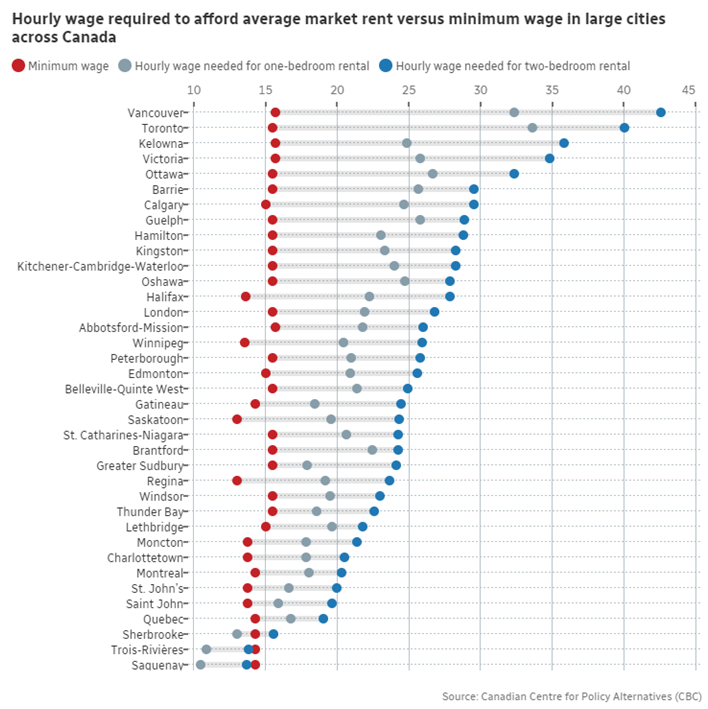
如果一個人想住在溫哥華普通的一居室公寓,按租金不超收入的 30%的標準,則需要每小時賺取32 加元;要住得起兩居室,一個人每小時必須掙 43 加元。
這兩種情況,都是最低工資的兩倍以上。這意味著,即使是一居室公寓,也必須有兩個人拿著最低工資才能住得起一居室公寓。
同樣,多倫多住一居室公寓,需每小時賺取33加元;住兩居室,則需每小時賺取40加元。
或許,這隻是危言聳聽,但正如文中所提及,當經濟出現問題、民眾生活水平下滑時,政府不應選擇忽視,應該動動腦筋,作出對策了。
Philip Cross: The Wall Street Journal asks a good question — does Canada belong in the G7?
https://www.countyweeklynews.ca/opinion/does-canada-belong-g7
Canada is not a leader on the international stage
Article content
A recent Wall Street Journal editorial suggested Canada should sit at the kiddies table in the NATO alliance instead of with the adults. This is because as a share of GDP our defence spending is seventh lowest among NATO’s 31 member nations. It’s also lowest among the G7, which prompted the Journal to question whether we are still willing to accept our responsibilities as a member of the G7. It concluded that if this country “doesn’t want to play that role, then the G-7 should consider a replacement.”
Wall Street Journal editorials have an impact. In January 1995 the paper’s editorialists drew global attention to our looming debt crisis by calling us “an honorary member of the Third World.” Their suggestion today that Canada could lose its G7 membership should therefore be taken seriously, especially since our inclusion in the group in 1976 owed less to our merits and more to U.S. concerns about left-wing European nations (France, Germany, Italy and pre-Thatcher Britain) having too much weight.
Great nations, institutions and people achieve greatness by aspiring to it. Max Mason, president of the University of Chicago, said in 1929 the institution “must be outstanding or nothing. There is no reason for its existence as just another university.” Chicago met that challenge, since garnering the most Nobel Prizes in economics of any institution. For a nation to be great, however, aspiration must extend beyond its leaders. President Kennedy, when touring NASA headquarters early in the 1960s, asked a cleaner why he was there. The worker replied, “Mr. President, I’m here to put a man on the moon.”
Canada is not a leader on the international stage. In his 2012 book Every Nation for Itself, global affairs expert Ian Bremmer wrote that: “Leaders have the leverage to co-ordinate multinational responses to transnational problems. They have the wealth and power to persuade governments to take actions they wouldn’t otherwise pursue. They pick up the checks that others can’t afford and provide services no one else will pay for. On issue after issue, they set the international agenda.” Name the last time Canada did any of those things.
Partly because of a decade of weak economic growth, Canada is no longer a serious player in the world economy. And we are unlike the rest of the G7, none of which is little brother to a big brother next door. Our relationship with the U.S. is more like Austria’s or Holland’s with Germany. Unless we prove we deserve a seat at the adults’ table, we should be talking with other middle powers about how to live next door to an elephant. Canada will not regain its stature on the world stage until renewed economic growth provides the money needed to rebuild our military capacity and the economic heft that makes others covet access to our markets.
Canada is limited by more than our relatively small population and economy, however. We are also constrained by the mindset that “people in Canada don’t think big,” as art historian Barbara Dodge put it. Canada today strives to be nice and progressive rather than great or strong. The Wall Street Journal editorial quoted from Justin Trudeau’s mandate letter to the minister of defence in 2021, establishing it as a priority that she “build an inclusive and diverse Defence Team, characterized by a healthy workplace free from harassment, discrimination, sexual misconduct and violence.” As the Journal editorialists sarcastically remarked, “See how that cultural manifestation works on the Ukrainian front lines.”
Michael Wilson’s posthumous 2022 memoir, Something Within Me, bluntly warned Canadians that “Yes, we are nice people, but let’s not try to be too nice … The emphasis on niceness represents a danger … of the Justin Trudeau’s government approach to international relations. We’re not here to build a nice country. We’re here to build a strong country — strong in our values, our economy, our technical achievements, and our influence in the world. You can’t build a strong country by just working to be nice to people. We have to step out in front and play a leadership role in matters where mid-sized countries can exert influence.”
Article content
In 1904 Wilfrid Laurier said “the twentieth century shall be the century of Canada and Canadian development … For the next hundred years, Canada shall be the star towards which all men who love progress and freedom shall come.” Laurier’s ambition for his country was laudable but his prophecy was spectacularly wrong: the 20th century clearly belonged to the United States, not Canada. Being potentially great is not enough. At some point potential must be realized, or Thomas Philippon’s observation about Brazil will also describe us: “the country of the future — and always will be.”
Philip Cross is a senior fellow at the Macdonald-Laurier Institute.















